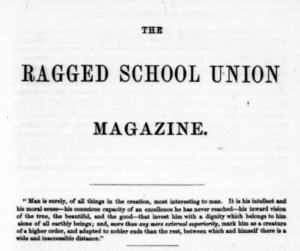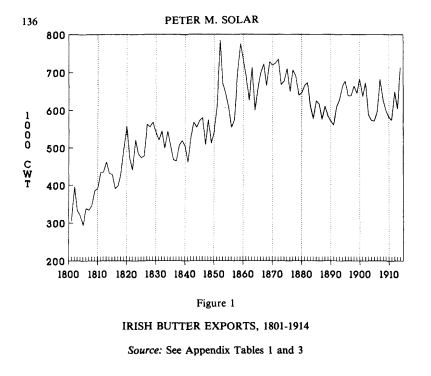1850: The Ragged School Union Magazine Address
“Man is surely, of all things in the creation, most interesting to man. It is his intellect and his moral sense—his conscious capacity of an excellence he has never reached— his inward vision of the true, the beautiful, and the good—that invest him with a dignity which belongs to him alone of all earthly beings, and, more than any mere external superiority, mark him as a creature of a higher order, and adapted to nobler ends than the rest, between which and himself there is a wide and inaccessible distance.”

“To diffuse useful information—to further intellectual refinement, sure forerunner of moral improvement—to hasten the coming of that bright day when the dawn of general knowledge shall chase away the lazy, lingering mists, even from the base of the social pyramid—this, indeed, is a high railing, in which the most splendid talents and consummate virtue may well press onward, eager to bear a part.”
“To break through this—to shed the light around,
Till every man shall feel himself a man.
And share the common joy, As one sun shines for all!
This be our task !—As thousands toil for one.
So we must toil for thousands ! ’’
VOLUME II.
LONDON:
PARTRIDGE & OAKEY, PATERNOSTER ROW.
JOHNSTONE, EDINBURGH: M’COMBE, GLASGOW: ROBERTSON, DUBLIN:
AND ALL BOOKSELLERS
Address
Another year has nearly run its eventful course. In briefly reviewing it, we cannot do so without emotion and gratitude when we reflect, that not a few of those who perused with interest the first pages of our present volume—whose sympathies, prayers, and assistance we largely shared—will not look upon the last: but although they have been called to “rest from their labours,” the work itself Him continued to prosper, so that the poor and neglected have more practical sympathizers now than at any former period. In raising up these, we believe that our humble labours have materially assisted —that the claims of the outcast poor have been listened and responded to, by many who would have remained ignorant of them, but for the repeated visits of our Magazine.
In no period since the first institution of Bagged Schools, have the necessity and advantages of our Journal been more deeply felt than during the present year. The time was when we had only to do battle with a cold, worldly scepticism, which was willing to be quiet, if let alone; and in no case did we require to act on the defensive, but at the doors of the Ragged Schools. Christians, poets, and philosophers, each awarded us their meed of praise, for our good intentions and deeds of mercy; and scarcely a voice was raised against us, except by the Jesuits and their hired emissaries.
During the past year, however, our work was subjected to a new ordeal. We had not only to labour and to plead, but also to defend. Through the medium of a daily journal, thirsting for patronage and popularity, an enemy assailed us, and by a series of wilful and “cunningly devised” charges, threatened our destruction.
But so completely were we enabled to expose the sophistry and ingenious falsehoods of our opponents, that—by the guiding hand of an overruling Providence—the blow was reverted back upon their own heads, leaving us unscathed. With gratitude to God for his great mercy do we state, that in scarcely a single instance are we aware of a Ragged School having lost a friend by the circumstance; while, on the contrary, the Central Society, at least, has gained not a few. A record of those transactions, and their results, will be found in our pages, and we believe will be remembered with gratitude by many, for the Lord’s goodness, when they who were most actively engaged in them will have appeared before a higher tribunal than those of earth, where motives and actions are understood with equal clearness.
We refer with pleasure to a new and very hopeful effort—chiefly originated through this Journal—in the publication of a Monthly Magazine for the Ragged Children. We have refrained from becoming publishers, except so far an necessity compelled us; but amongst the teeming literature of the day, there was not found a sufficiently attractive periodical for these children, but those of the lowest and most pernicious description.
We believe that very important and beneficial results will accrue from the publication. Although commenced only in August last, by the time this statement is in the hands of our readers, thirty thousand copies of that little messenger will have been circulated amongst the poorest of the poor in London and the provinces; each containing, in an adapted style, some portion of those great and saving truths, “that maketh wise unto salvation.”
By this means the seeds of Gospel truth are being carried into many a dreary home, and, by the grace of God, may yet be sown in some barren hearts, where they may bring forth “the peaceable fruits of righteousness.” To those who have kindly assisted us, either by increasing our circulation, or in suitable contributions to our pages, we express sincere gratitude.
Assistance in both those departments is still greatly needed, and must be obtained, before this division of our labours can reach a position nearly commensurate with its importance. The large Magazine still stands on the verge of uncertainty, from whence it might easily be removed, if every friend of Ragged Schools would procure a new subscriber at the commencement of next year, and subscribe for one himself.
We think the successful labours of the past, the importance of the work, and the growing necessity for increased exertions, all unite in demanding such an effort, which, if made al once, would enable us to increase the merits of the periodical, and thus render more important service to the cause. This service, if needful in the past, will be still more required in future. We have had already to contend against the encroachments of the “man of sin,” in our evangelistic efforts among the poor.
Present appearances indicate, that in this warfare still greater conflicts await us; in these our present strength will be feeble, unless we can summon others to our aid. Let the education of our poor be left as much as it has been to infidels and Romish emissaries—let the possessors of the pure Gospel be as negligent as hitherto—and it may be found, when too late, that the sacred institutions of our country have been resting upon a volcano, which may yet burst forth, blotting out the sun of British prosperity in blood and darkness !
But if, on the other hand, we are alive to our duties and responsibilities—if we only use the means which God has mercifully placed within our power—if we strive actively and vigorously to leaven the minds of the people with the saving doctrines of pure evangelical truth—they will become au impregnable barrier against every foreign “aggressor,” whether he be pope, cardinal, or demagogue.
– A
The above is a reproduction of the article ‘Intelligence’ found in the 1850 February publication of the Ragged School Union Magazine.
Tuesday 4 June 1850, Column 724, Fitzstephen French, British Parliament
“The poor-law, on its introduction, was intended to ameliorate the condition of the Irish population. It was the object of the Government that that amelioration should be called into effect by means of the resources of Ireland; and it was also the object not alone of the Government, but of the Members representing English constituencies, that no further claim for the support of the Irish people should be made on the funds of this country. In each and all of these particulars this Bill had been a total and complete failure. He had opposed the present poor-law, and said it would be as useless in ordinary years as it would be inefficient in times of famine, and would tend to demoralise the people, and absorb, without any Toggle showing location of beneficial result, the entire capital of the country. Such was still his opinion, and subsequent experience justified every anticipation he had made. The measure was introduced on the assumption that the annual expenditure would not exceed 280,000l; but last year it exceeded 2,167,000l, whilst the causes of that increase were left untouched. Parliament offers a bounty on pauperism, and are yet astonished that paupers multiply; they cast an unlimited weight on property, and appear surprised at property being unequal to the burden. In England, when the 43rd of Elizabeth was 145 years in operation, the amount levied under it on an average of three years amounted to 689,971l.; but the reason of that was, that at that time the administration of the funds was left to the persons interested in them—the ratepayers and magistrates of England.”
Hansard Parliamentary Record: https://hansard.parliament.uk/Commons/1850-06-04/debates/5e464fe6-7da2-4686-b946-ce817a5a9961/PoorLaws(Ireland)
“Though the estimates for the pre-famine period are probably quite reliable, the pattern of change over the famine and in the 1850s is less well established. The only series for Irish ports which cover this period, are those for Belfast exports and for sales at Cork buttermarket.39Both of these show rather substantial growth in the late 1840s. Belfast exports doubled from 1845 to 1851, and Cork sales increased by 17per cent. Yet receipts at the British ports plus shipments abroad increased by only 4 per cent. These differences probably reflected the rapid expansion of the Irish railway system in the late1840s, so the British port series would be the more reliable indicator of total trade.40 Both Cork sales and the interpolator show peaks in 1852. The peak in the latter is so pronounced that it suggests total butter exports of almost 800,000 cwt, which would have been the highest level reached in the nineteenth century.”

Peter M. Solar (1990). The Irish Butter Trade in the Nineteenth Century: New Estimates and Their Implications. Studia Hibernica, (25), 134–161. doi:10.2307/20496253
